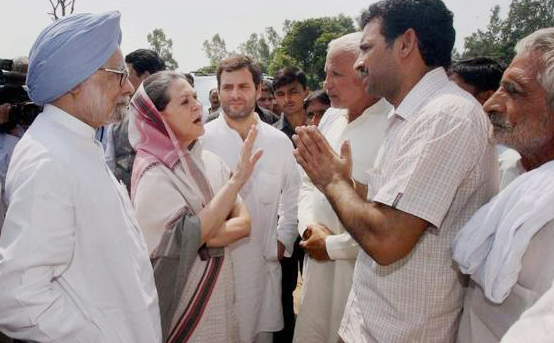
Bassi/Tavli/Kutba, Sep 17: On the Muzaffarnagar-Shahpur road is the Tavli madrasa. Now home to over 300 Muslims who have fled from their villages after the outbreak of recent communal violence, it is one among the many makeshift relief camps that dot the district’s landscape.
It is here Shamshad Chaudhary piercingly asked Congress vice-president, Rahul Gandhi, accompanying Prime Minister Manmohan Singh and UPA chairperson Sonia Gandhi, on a visit to the riot-affected areas on Monday morning, “Why did you — the Congress party and Jawaharlal Nehru — stop us from going away in 1947? We have been reduced to strangers in our own land.” As Mr. Chaudhary recounted, Mr. Gandhi told him what had happened was ‘very wrong’. “You are not strangers … The first responsibility is with the State government, but we will do whatever we can to help.”
Through their quick three-hour run through Muzaffarnagar — stopping over at relief camps for displaced Muslims, meeting Jat villagers, and visiting the family of the slain IBN7 journalist, Rajesh Verma — India’s top political leadership got a sense of the deep chasms that have developed among communities in western Uttar Pradesh.
‘New partition’
Over 40,000 Muslims have got displaced in the past 10 days in western U.P. They are living in camps, at homes of relatives, in private farms of well-wishers, at police stations. As one of them put it, ‘The country was partitioned once. Now, our villages are getting partitioned.” None of them are willing to return home.
At the Bassi camp, Asiya, originally from the nearby Kutba village, told Ms. Gandhi they needed a place to stay. “We cannot go back. Winter is approaching. We need a house, and we need compensation to start our lives.” When asked if she would return if her old Hindu neighbours assured her of security, she said, “They are the ones who killed, looted, and burnt our homes. How can we trust their word?”
Her words were echoed by Mehmood Hassan, also from Kutba, who demanded punishment for culprits, houses for victims, commensurate compensation for the land they would lose, jobs to family members of the dead, and a CBI enquiry into the riots.
No security guarantee
There is sound logic for not returning.
Kutba village — Asiya’s and Mehmood’s home — resembles a ghost town. Eight Muslims were killed here. And all Muslim residents, 3,000 of them according to one count, have fled. Shutters are down in the middle of the day. Kids are locked inside. Few are seen walking on the streets.
Inside Jat homes, the mood of belligerence is starkly different from the despondency among Muslims.
When asked if they would assure Muslims of security, “We did not tell them to go. Why should we beg them to return?” says an angry, and loud, middle-aged Hindu woman at the house of the village leader. “They have all gone to get compensation. There was no threat from us.”
Another Jat elder put things even more bluntly. “If they see us, they will take revenge. If we see them, we will vent out our anger. There will be no peace until the balance of power is sorted out. One community in each village will remain dominant.” Both asked not to be named.
A local teacher, Ram Kishore, said that after the incidents, over a 100 young Jat men of the village were booked for indulging in violence. ‘These FIRs can ruin their lives. People blame Muslims for trapping their children.” Mr. Kishore suggested that the complex web of interdependence between Jats and Muslims was crumbling. “We need Muslim labourers for our fields, Muslim carpenters, iron-smiths. They need us for income.” In a school run by his son, 150 children were Muslims, and it looked like their academic year — if not their lives — would go waste, living in camps. But despite knowing this, he said they could not provide any ‘security guarantee’.
Gordhan, a relative of the local Pradhan, and a member of the Bharatiya Kisan Union, which has given a call for peace, nodded. Admitting that Muslims were killed in the village, he said, “The onus lies on us to convince Muslims to return. But we can’t control how people will react.” He added, poignantly, sitting in front of a picture of BKU leader Mahendra Singh Tikait on the wall, the era of ‘Jat-Muslim unity’ was over.
A little before the PM and the Gandhis arrived, a security drill was under way in the Tavli camp. Mr. Shamshad Chaudhary — the man who later questioned Mr. Gandhi — told a local police official he was a refugee and asked to be let in. He was told, sneeringly, “What refugee? We all know what games you people are up to.” The SHO-level officer was a local Jat. Shamshad said, “It reminded me of the local thanedar’s reaction when I called to say they have attacked the mosque in my village, Kharda. He had told me — ‘what can I do? Go, put out the fire.’ This is the mindset.”
Dr. Singh promised ‘strictest punishment’ for the riot perpetrators, pledged that the priority was to provide a sense of ‘security’, would ensure people return home, and till they do so, provide adequate care. But even as India’s most powerful leaders came, saw and left, the wounds show no signs of healing; the story of violence has not yet ended; and erstwhile neighbours and friends continue to look at each other with hatred.







Comments
Add new comment